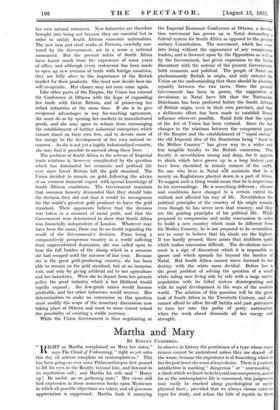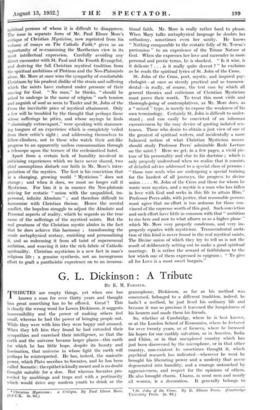Martha and Mary
BY EVELYN UNDERHILL.
fit RIGHT as Martha complained on Mary her sister," says The Cloud of Unknowing, " right so yet unto this day all actives complain on contemplatives." This has been going on ever since Pithecanthropus first paused to lift his eyes to the Reality beyond him; and listened to its mysterious call ; and Martha his wife said " Hurry up ! Be useful—go on gathering nuts." Her views still find expression in those numerous books upon Mysticism in which all possible objections are taken, and all generous appreciation is suppressed. Martha finds it annoying to observe in history the persistence of a type whose expe- riences cannot be understood unless they are shared—all the worse, because the experience is of Something which in her deepest heart she must always desire. There is a certain satisfaction in marking " dangerous " or " unrewarding " a climb which we know to be beyond our own powers, and so far as the contemplative life is concerned, this judgement may easily be reached along psychological or meta- physical lines ; provided that we always choose extreme types for study, and refuse the title of mystic to those spiritual persons of whom it is difficult to disapprove. The issue in separate form of Mr. Paul Elmer More's critique of Christian Mysticism, now reprinted from his volume of essays on The Catholic Faith,* gives us an opportunity of re-examining the Martherian view in its most intellectual expression. Carefully avoiding any direct encounter with St. Paul and the Fourth Evangelist, and deriving the full Christian mystical tradition from the spiritual ambitions of Plotinus and the Neo-Platonists alone, Mr. More at once wins the sympathy of comfortable Christians by his prudent dislike of the strain and suffering which the saints have endured under pressure of their craving for God. " No man," he thinks, " should be asked to undergo in the name of religion " such tension and anguish of soul as seem to Tauler and St. John of the Cross the inevitable price of mystical attainment. Only a few will be troubled by the thought that perhaps those whose sufferings he pities, and whose sayings he finds " alarmingly extravagant," were speaking with stammer- ing tongues of an experience which is completely veiled from their critic's sight ; and addressing themselves to fellow-climbers, not to those who watch their ant-like progress to an apparently useless consummation through a telescope upon the terrace of the ecclesiastical hotel.
Apart from a certain lack of humility involved in criticizing experiences which we have never shared, two chief assumptions disturb our faith in Mr. More's inter- pretation of the mystics. The first is his conviction that in a changing, growing world " Mysticism " does not change ; and when it does, we must no longer call it Mysticism. For him it is in essence the Neo-platonic striving for ecstatic " union with the unqualified, im- personal, infinite Absolute " ; and therefore difficult to harmonize with Christian theism. Hence the mental conflict, the hopeless struggle to adjust the Absolute and Personal aspects of reality, which he regards as the true cause of the sufferings of the mystical saints. But the real greatness of the Christian mystic abides in the fact that he does achieve this harmony ; transforming the crude metaphysical ecstasy, enriching and personalizing it, and so redeeming it from all taint of supersensual ambition, and weaving it into the rich fabric of Catholic spirituality. Christian mysticism is a new fact in man's religious life ; a genuine synthesis, not an incongruous effort to graft a pantheistic experience on to an incarna- tional faith. Mr. More is really rather hard to please. When Mary talks metaphysical language he doubts her orthodoxy, sometimes even her sanity. He knows " Nothing comparable to the ecstatic folly of St. Teresa's pretension " to an experience of the Triune Nature of God. When she expresses her love and surrender in more personal and poetic terms, he is shocked. " Is it wise, is it delicate ? . . . is it really quite decent ? " he exclaims as he reads the spiritual lyrics of St. John of the Cross.
St. John of the Cross, poet, mystic, and inspired psy- chologist—at once so sternly practical and so transcen- dental—is really, of course, the test case by which all general theories and criticisms of Christian Mysticism must prove their worth. To treat this most virile and thorough-going of contemplatives, as Mr. More does, as a " mixed " type, is merely to expose the weakness of his own terminology. Certainly St. John is difficult to under- stand ; and can easily be convicted of an inhuman excessiveness by the easy device of quoting isolated sen- tences. Those who desire to obtain a just view of one of the greatest of spiritual writers, and incidentally a more balanced notion of what Christian Mysticism means should study Professor Peers' admirable Rede Lecture on the saint.t Here we get, in a few pages, a vivid pic- ture of his personality and clue to his doctrine ; which is only properly understood when we realize that it consists of detailed advice addressed to a special class of persons : " those rare souls who are undergoing a special training for the hardest of all journeys, the progress to divine union . . . . St. John of the Cross and those for whom he wrote were mystics, and a mystic is a man who has fallen in love with God and seeks in this life to attain Him." Professor Peers adds, with justice, that reasonable persons must agree that no effort is too arduous for those con- vinced of the supreme worth of this goal. Such conviction and such effort have little in common with that " ambition to rise here and now to what allures us as a higher plane " which Mr. More very properly condemns, and very im- properly equates with mysticism. Transcendental ambi- tion of this kind is never found in the real mystical saints. The Divine union of which they try to tell us is not the result of deliberately setting out to make a good spiritual marriage. It is rather the reward of faithfulness to the law which one of them expressed in epigram ; " To give all for Love is a most sweet bargain."































 Previous page
Previous page